
Home Occupant Report
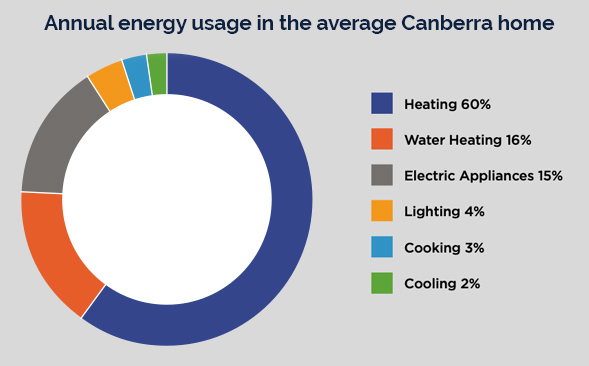
In summer a comfortable and cost-effective range to set the thermostat is 25-27°C, and in winter it is 18-20°C
Dear Irene,
Congratulations on completing your home energy assessment. This is an important step towards improving the energy efficiency of your home.
Taking action on some or all of the recommendations in this report will improve your comfort, save you money and help protect the environment.
This report focuses on actions your household can take. At the end is a link to a second report focused on actions the owner could take.
Your energy usage is likely to be similar to the graph on the right. You are likely to achieve the most savings by reducing heat loss during winter and using heaters efficiently.
When you’ve read your recommendations, check out the links and resources at the end of this report and at www.climatechoices.act.gov.au.
If you live in the ACT, you can get free expert advice on saving energy in your home including additional support implementing these recommendations or checking your bills, by calling the ACT Sustainable Home Advice line on 1300 141 777 or emailing SustainableHomeAdviceProgram@act.gov.au.
If you found your home energy assessment and report useful please let your friends, family and networks know.
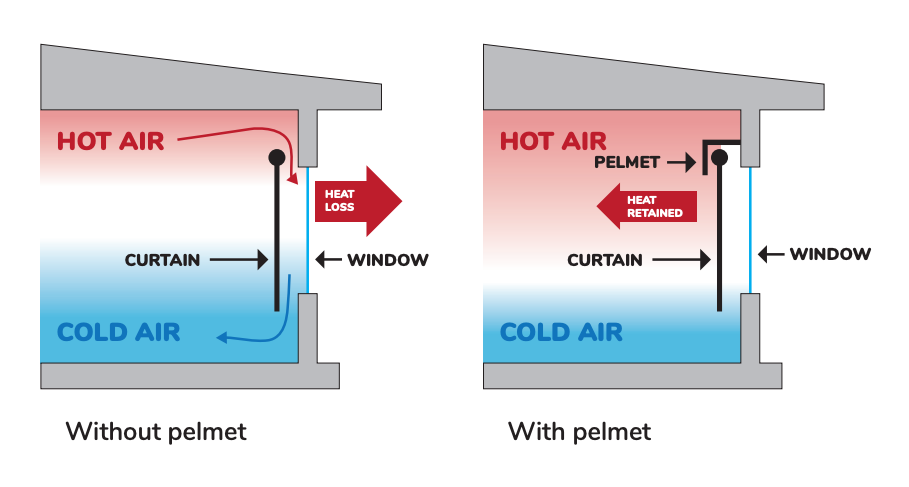

Windows and draughts
Your recommendations
- Draughts waste a lot of energy. Stopping them is the most cost-effective action you can take to make your home more comfortable and can reduce heat loss in winter by up to 25%.
- By covering your windows effectively you can reduce your home's heat loss in winter and gain in summer by up to 20%. Hang blockout curtains and attach pelmets to stop cold air moving from your windows into your rooms in winter and to stop heat entering in summer. You can buy curtain rods that stay up with springs and don’t need to be attached to the wall, so you can take them with you. You can make your own temporary pelmets from cardboard - online videos can show you how.
- A lot of heat is transferred through single glazed windows so it's very important to cover your windows effectively. Do-it-yourself secondary glazing – using bubble wrap or clear plastic films – is a temporary and cost-effective way to insulate any windows that don't have insulating blinds or blockout curtains and pelmets.
- Use gap-filler rod, plastic film, or tape to block your wall vents, as a lot of energy is lost through vents.
- You can reduce heat loss or gain from ducting and vents by closing adjustable vents whenever the unit is off, for example at night and when you are out of the house. (Remember to open the vents when you turn the unit on.)
- Since your windows are very draughty, it's very important to block those draughts, for example with gap-filler rod or tape. If necessary, filler rod and tape can later be removed carefully without damaging surfaces.
- Stopping the draughts beneath and around your draughty doors, for example with door snakes and tape, will save energy and is very easy to do.
- The very draughty floors in your home will be wasting a lot of energy. Block gaps along skirting boards with gap-filler rod. Use gap-filling materials, rugs or floor coverings to stop draughts through your floors as much as possible.
- Attach pelmets above your curtains to stop cold air moving from your windows into your rooms in winter and to stop heat entering in summer. You can make your own temporary pelmets from cardboard - online videos can show you how.
You can find more detailed information about draught-proofing, window insulation and window coverings in the links at the end of this report.
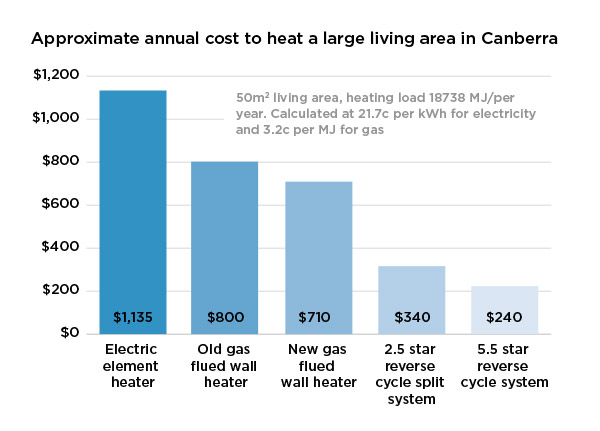
Heating
Your heating recommendations
- Try to only heat your space to between 18 and 20 degrees Celsius. This is a comfortable and cost-effective temperature range. Every degree higher can add 10% to your energy costs.
- Personal heated throw blankets cost only about 3 cents per hour to run and can keep you very warm, even in a cold room
- Separating your living space from hallways and other rooms with temporary rods and curtains can reduce costs and keep your living space warmer.
- Air conditioning units should be serviced annually. If contacting the property owner or manager to request this, you could note that this extends the life of the unit, saving money in the long term.
- It is important to service and undertake a carbon monoxide check of gas heaters annually.
- To ensure your gas ducted heating system is running as efficiently and safely as possible, keep the intake clear and regularly clean the dust from the intake filter and vents.
There is more information about heating your home in the links at the end of the report.
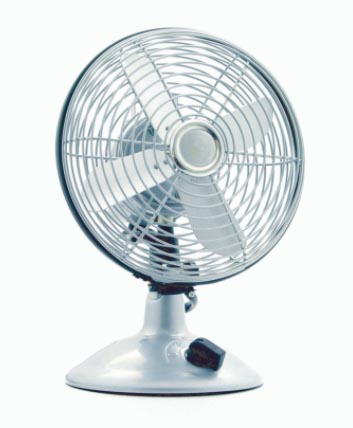
Cooling
Your cooling recommendations
- Keep your home cooler in summer by opening your windows, doors and curtains when it cools down at night, then closing them in the morning as soon as it starts to get warm outside.
- If you use air conditioning, 25 to 27 degrees Celsius is a comfortable and cost-effective summertime temperature range. Every degree lower can add 10% to your running costs.
- Regularly check and clean the dust from your air conditioning vents and filters to ensure your system is running as efficiently and safely as possible. This can reduce running costs by 5-15%.
- Keep all windows and doors closed when your air conditioner is operating to avoid wasting energy.
- If the space you need to cool can't be closed off with doors, try zoning it off with curtains. (You can buy curtain rods that stay up with springs and don’t need to be attached to the wall.)
- Air conditioning units should be serviced annually. If contacting the property owner or manager to request this, you could note that this extends the life of the unit, saving money in the long term.
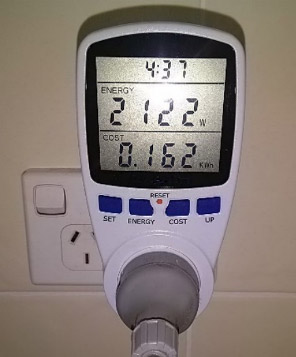
Appliances
Your appliances recommendations
- You can find out how much each of your appliances is costing you by getting a plug-in power meter (see photo). It will show how much power the appliance has used since it was plugged into the meter and will calculate the cost. You can buy power meters at hardware stores or online.
- When the time comes to buy a new appliance, check the energy star rating labels (see https://www.energyrating.gov.au/). More stars mean greater energy efficiency. Choosing a more energy-efficient appliance will reduce energy consumption and help lower energy bills.
- Use the eco setting if your machine has one.
- Avoid pre-rinsing dishes, and use cold water if you have to pre-rinse.
- A new, efficient dishwasher could save considerably on running costs. Look for a unit with an eco function and the best energy star rating you can afford.
- Use the eco setting if your washing machine has one.
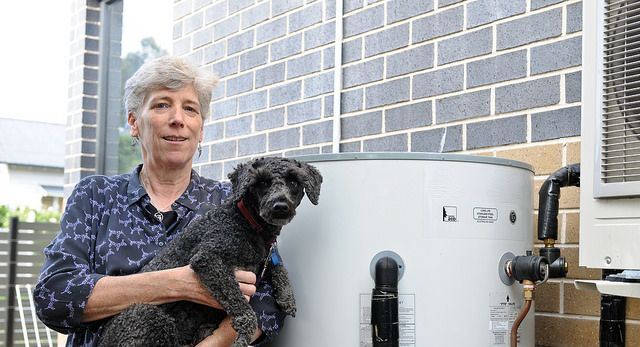
Hot Water
Your recommendations
Up to 70% of your hot water is used in the shower.
- Insulate all pipes going into and out of your hot water unit with foam tubing, known as lagging, to prevent heat loss, especially the two metres closest to your water heater.
- To check whether you have an efficient showerhead, put a standard (9 litre) bucket in the shower, turn all other taps in the house and garden off, turn the cold tap in the shower on full, and time how long it takes for the bucket to fill. If the bucket takes less than 1 minute to fill, your showerhead is not efficient.
- A 3 star showerhead will halve the amount of hot water and energy used per minute. Note: in the ACT a licensed plumber is needed to install a new showerhead. This requires permission from the property owner.
- Baths typically use about double the water and energy of a shower. You can reduce your costs by showering instead, or by taking fewer and/or shallower baths.
Lighting
Your lighting recommendations
- Swap light bulbs with LED lights as they need replacing. Incandescent, halogen and compact fluorescent bulbs and fluorescent tubes can all be replaced with long-lasting efficient LED versions.
Insulation
Your insulation recommendations
- Most heat enters and exits through the ceiling. If your home does not have adequate ceiling insulation, consider providing the property owner report to your property manager or owner (see link below). It has more detailed recommendations about insulation.

Energy Bills
Your recommendations
- Call your retailer and ask whether you are on the lowest cost plan for your energy use – some households are better off with a tariff based on the time of day, while others benefit more from a flat rate.
- While all electricity in the ACT is from renewable sources, purchasing Green Power from your retailer is a way you can encourage more investment in renewable energy in Australia. https://www.greenpower.gov.au
- For more tips see: https://www.energymadeeasy.gov.au/article/get-energy-smart/
- Based on your responses, changing electricity providers and/or plans could save you hundreds of dollars a year. Call your retailer and ask whether you are on the lowest cost plan for your energy use – some households are better off with a tariff based on the time of day, while others benefit more from a flat rate.
- Based on your responses you are on a typical electricity plan at present. To keep your costs down, it's a good idea to call your retailer annually to ask whether you are on the lowest cost plan for your energy use.
- Based on your responses, changing gas providers and/or plans could save you hundreds of dollars a year. Call your retailer and ask whether you are on the lowest cost plan for your energy use – some households are better off with a tariff based on the time of day, while others benefit more from a flat rate.
Electricity Usage
- Your daily electricity usage in summer (14kWh) is 1 times the average (14.4kWh) for a household of your size.
- Your daily electricity usage in winter (28kWh) is 1.2 times the average (23kWh) for a household of your size.
Gas Usage
- Your daily gas usage in summer (20MJ) is 0.7 times the average (30.5MJ) for a household of your size.
- Your daily gas usage in winter (48MJ) is 0.2 times the average (198.3MJ) for a household of your size.
Property Owner Report
The owner's report focuses on fixed appliances, insulation and actions the owner can take. If you are renting, you may like to send it to the property manager or owner.
View the Property Owner Report
Links & Resources
- Energy in the ACT https://www.climatechoices.act.gov.au/energy
- Heating your home https://www.climatechoices.act.gov.au/energy/energy-efficiency/heating-for-your-home
- Staying warm on less energy https://act-hea.com.au/wp-content/uploads/2021/01/Actsmart-Staying-warm-on-less-ACCESS.pdf
- Actsmart Energy Saving Guide (a detailed guide and action plan template) https://act-hea.com.au/wp-content/uploads/2021/01/ACTSmart-ESG-12-20.pdf
- Draught-proofing DIY videos https://www.climatechoices.act.gov.au/policy-programs/sustainable-home-advice-program and https://www.greenityourself.com.au/category/topics/draught-proofing
- Make the Switch from gas appliances to an efficient all-electric home https://maketheswitch.org.au
- Better Renting Energy Efficiency Guide for People Who Rent https://www.betterrenting.org.au/energy_efficiency_renting
- Renters Guide to Sustainable Living https://renew.org.au/publications/renters-guide-to-sustainable-living/
- Energy rating website https://www.energyrating.gov.au/
- The renting book https://act-hea.com.au/wp-content/uploads/2021/01/The-Renting-Book.pdf
- My Efficient Electric Home Facebook group https://www.facebook.com/groups/MyEfficientElectricHome

For further information about your recommendations and how to implement them please contact:
For further information about ACT energy efficiency programs and technical advice, call the ACT Sustainable Home Advice line on 1300 141 777, email sustainablehomeadviceprogram@act.gov.au, or visit www.climatechoices.act.gov.au.


 Home Energy Assessment
Home Energy Assessment

